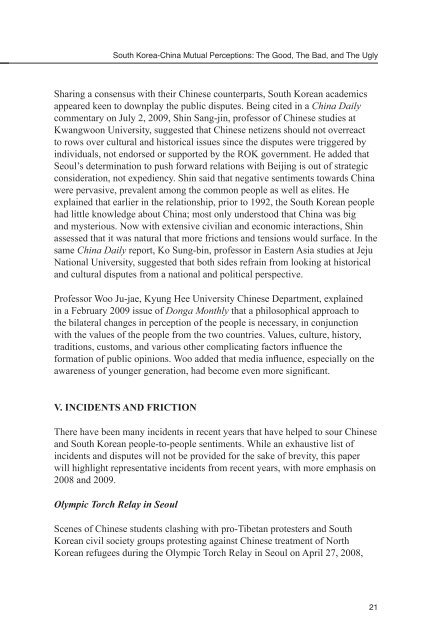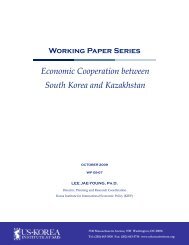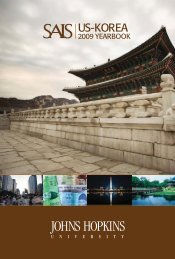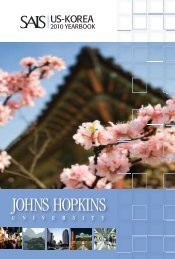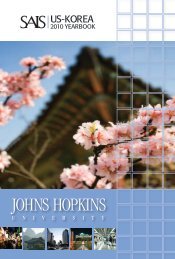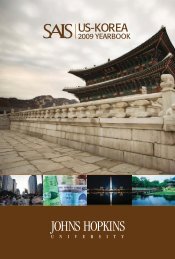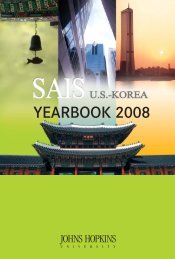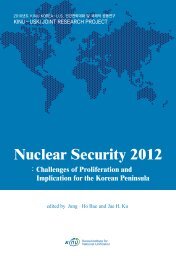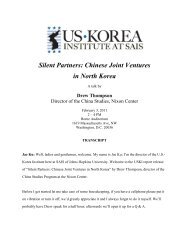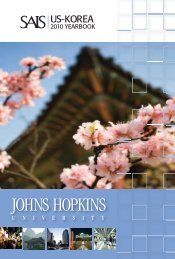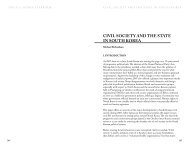US-Korea Institute at SAIS
US-Korea Institute at SAIS
US-Korea Institute at SAIS
- No tags were found...
You also want an ePaper? Increase the reach of your titles
YUMPU automatically turns print PDFs into web optimized ePapers that Google loves.
South <strong>Korea</strong>-China Mutual Perceptions: The Good, The Bad, and The Ugly<br />
Sharing a consensus with their Chinese counterparts, South <strong>Korea</strong>n academics<br />
appeared keen to downplay the public disputes. Being cited in a China Daily<br />
commentary on July 2, 2009, Shin Sang-jin, professor of Chinese studies <strong>at</strong><br />
Kwangwoon University, suggested th<strong>at</strong> Chinese netizens should not overreact<br />
to rows over cultural and historical issues since the disputes were triggered by<br />
individuals, not endorsed or supported by the ROK government. He added th<strong>at</strong><br />
Seoul’s determin<strong>at</strong>ion to push forward rel<strong>at</strong>ions with Beijing is out of str<strong>at</strong>egic<br />
consider<strong>at</strong>ion, not expediency. Shin said th<strong>at</strong> neg<strong>at</strong>ive sentiments towards China<br />
were pervasive, prevalent among the common people as well as elites. He<br />
explained th<strong>at</strong> earlier in the rel<strong>at</strong>ionship, prior to 1992, the South <strong>Korea</strong>n people<br />
had little knowledge about China; most only understood th<strong>at</strong> China was big<br />
and mysterious. Now with extensive civilian and economic interactions, Shin<br />
assessed th<strong>at</strong> it was n<strong>at</strong>ural th<strong>at</strong> more frictions and tensions would surface. In the<br />
same China Daily report, Ko Sung-bin, professor in Eastern Asia studies <strong>at</strong> Jeju<br />
N<strong>at</strong>ional University, suggested th<strong>at</strong> both sides refrain from looking <strong>at</strong> historical<br />
and cultural disputes from a n<strong>at</strong>ional and political perspective.<br />
Professor Woo Ju-jae, Kyung Hee University Chinese Department, explained<br />
in a February 2009 issue of Donga Monthly th<strong>at</strong> a philosophical approach to<br />
the bil<strong>at</strong>eral changes in perception of the people is necessary, in conjunction<br />
with the values of the people from the two countries. Values, culture, history,<br />
traditions, customs, and various other complic<strong>at</strong>ing factors influence the<br />
form<strong>at</strong>ion of public opinions. Woo added th<strong>at</strong> media influence, especially on the<br />
awareness of younger gener<strong>at</strong>ion, had become even more significant.<br />
V. INCIDENTS AND FRICTION<br />
There have been many incidents in recent years th<strong>at</strong> have helped to sour Chinese<br />
and South <strong>Korea</strong>n people-to-people sentiments. While an exhaustive list of<br />
incidents and disputes will not be provided for the sake of brevity, this paper<br />
will highlight represent<strong>at</strong>ive incidents from recent years, with more emphasis on<br />
2008 and 2009.<br />
Olympic Torch Relay in Seoul<br />
Scenes of Chinese students clashing with pro-Tibetan protesters and South<br />
<strong>Korea</strong>n civil society groups protesting against Chinese tre<strong>at</strong>ment of North<br />
<strong>Korea</strong>n refugees during the Olympic Torch Relay in Seoul on April 27, 2008,<br />
21


